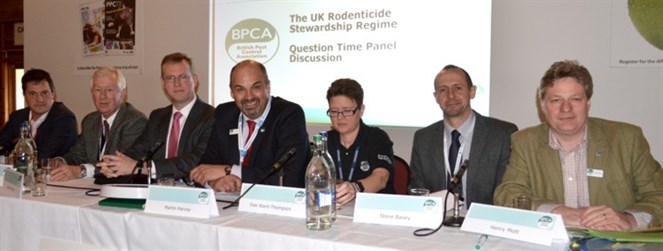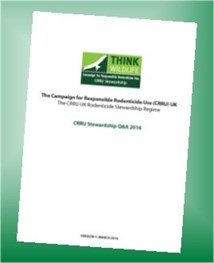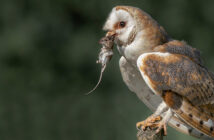Are you up to speed with the requirements of the new UK Rodenticide Stewardship regime? Judging by the number of people packing into the Question Time session at the PPC Live event in Peterborough on 16 March, many pest professionals still have a lot of questions they want answering. Fortunately the session provided plenty of answers. Plus theres now a new Q&A document available to help you keep up with whats happening.
The Campaign for Responsible Rodenticide Use (CRRU) has published a useful 4-page document which provides answer to the eight most commonly asked questions about the implementation of the UK Rodenticide Stewardship regime.
| These include: Why do we need stewardship? What does it entail? Why are farmers exempt? How will success be measured? And, what happens if it doesn’t have the desired effect? Copies can be downloaded from the Pest library or from the CRRU website.
Announcing the availability of the Q&A document CRRU stressed the importance of the imminent changes to rodenticide labels. The first rodenticides with stewardship labels will start to appear from next month i.e. April 2016. For pest professionals this means that they will be asked for proof of competence and I/D when buying these rodenticides for use outside buildings. This proof of competence and identity requirement is the cornerstone of the UK Rodenticide Stewardship regime. It applies to rodenticides sourced from all suppliers, including those selling via the internet. Of course there will still be stocks of products with the old labels in the system so it will still be possible to purchase ‘old stock’ without the proof of competence check during the transition phase. This ends on 30 September 2016 after which all professional use products will carry stewardship labels. |
|
|
 The PPC Live Question Time panel. From left: Tom Wornham (NFU), Dr Alan Buckle (CRRU), Rupert Broome (Killgerm Group), Martin Harvey (chairman), Dee Ward-Thompson (BPCA), Steve Bailey (Barrettine) and Henry Mott (Conquer Pest Control) |
||
| Difficult questions Appropriately delegates to the PPC Live seminar on stewardship on 16 March took their seats to the theme tune of BBC’s Question Time. Taking David Dimbleby’s role as chairman was BPCA president, Martin Harvey, who entered into the spirit of the occasion with an introduction to the city of Peterborough that David Dimbleby would have been proud of. As on TV, those who had pre-registered had been canvassed, in advance, for their questions, although whether the panel had been given sight of those questions beforehand wasn’t made clear. However, there had certainly been no attempt to dodge the difficult ones. One of the most difficult questions is how the regime will be policed and there isn’t a definitive answer. Yes, suppliers have systems in place to vet purchasers but what’s to stop someone then selling product on to non-qualified individuals. Whilst such practice will be illegal, as it will contravene label requirements, the best way old stopping it will be for all pest professionals to act as the eyes and ears of the regime and be prepared to blow the whistle on offenders. Trade associations also have a big role to play. It was also good to see a representative from the National Farmers Union (NFU) on the panel. Tom Wornham was very honest about the low base of rodenticide awareness that the farming sector was starting from. He also pointed out that whilst the farming unions are supporting stewardship, not all farmers belong to a union. Asked about how farmers can be persuaded to spend on professional help he suggested that there was a need to sell the long-term benefits. He felt that pest control was an undervalued product and that our industry needed to get out to the agricultural trade and county shows and sell itself. |
||



